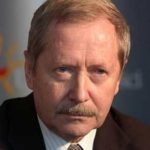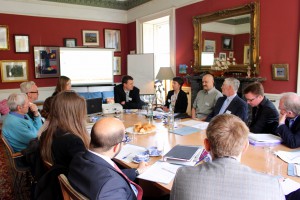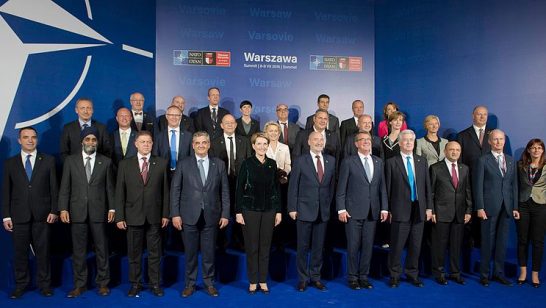
Last year’s events in Ukraine once again raise the question of what kind of country Russia is, and what kind of country it wants to be. It is not a new question and does not elicit an easy answer.
Churchill once said “I cannot forecast to you the action of Russia. It is a riddle wrapped in a mystery inside an enigma.” After the turmoil and uncertainty following the breakup of the Soviet Union, one had hoped that Russia would gradually become less mysterious and more predictable. Its behaviour internally and on the international arena as well as its own value system seemed to be getting closer to that of the countries in the democratic West. This hope was clearly demonstrated by the concept of a common political space “from Vancouver to Vladivostok”, as well as an agreement on cooperation between the European Union (EU) and Russia on a vast catalogue of areas such as economics, social issues as well as security and foreign policy. Some very prominent politicians even proposed the admission of Russia into NATO.
Failure of Russia’s project of opening to the West
From Moscow, the EU was seen as an essential partner, which together with Russia could form a counterweight to the United States, China and other emerging powers in Asia. This hope was based on the conviction that to remain competitive with the US, the EU will have to rely on cooperation with Russia. Another assumption popular in Moscow was that the EU potentially had more common interests with Russia than with the US.
Moscow’s conviction that economic cooperation between Russia and the EU was attractive to Brussels was enhanced by the fact that the Russian economy was thriving. Gone were the memories of 1998 when Russia had to declare insolvency, the rouble had to be drastically devalued and real income per capita dropped 30%. In the mid-2000s, the dominant sentiment amongst the Russian elite was that under Vladimir Putin, Russia would soon become one of the leading industrial powers, the rouble would be a global currency and Moscow would become a global financial centre.
However, the global financial crisis of 2008 was a wake-up call. At the start of the year, it looked as if Russia would manage to get through the crisis unscathed. It soon became apparent however that it would be very seriously affected. With GDP falling by the biggest proportion of all the G-20 countries, bigger even than Greece, hopes for steady economic development withered away. The conviction that Russia would achieve a place amongst the world’s leading industrial powers in the very near future vanished into thin air.
Despite the high oil and gas prices, the Russian economy displayed all the features of permanent stagnation. The informal deal that Putin made with Russian people to “secure permanent and quick growth of your standards of living but you will not interfere with my running of the country” now seemed under threat. The only option was to mobilize Russian society around a grand idea such as the restitution of Russia as a great and strong power, widely feared and respected in the world.
In this context, 2008 gave Russia a new and important insight. The war with Georgia demonstrated the West’s reluctance to confront Russia. On the contrary, it appeared as if the West was ready to acquiesce to the Russian practice of waging a preventive war, extracting parts of other countries’ territories and tying them more closely to Russia. The “reset” policy was treated as proof of the Western willingness to carry on relations with Russia on a business as usual basis.
It also soon became clear that Russia would not be able restore its greatness by acquiring special relations with the EU and NATO. For Russia, this meant the ability of not only contributing to, but also blocking important political, economic or defence projects. It thus needed to devise another approach to be able return to the world stage as a major global player.
Return of neo-imperial thinking
Since Russia drew the conclusion that it could not be the major player in the Euro-Atlantic “solar system”, it then attempted to create another one where it could feature at the centre. It was important to formulate an ideological framework for such a new construct.
Looking at what kind of state Putin wants Russia to be, and what place and role he envisages for Russia in the 21st century, it is impossible not to have a feeling of déjà vu; an impression that what we see is a return to ideas characterising Russia and its political system under the tsarist regime. The foundation of this system was formulated almost 200 years ago by Sergey Uvarov who listed three basic features: autocracy, orthodoxy and nationalism. The historical mission of Russia was not only to gather all Slavonic lands but also to protect the orthodox religion wherever and by whomever it was practiced. Autocracy meant a total domination of the state embodied by the tsar. Any grass-roots activity was illegal and reforms could come only at the tsar’s initiative.
According to this view, Russia was the only genuine political and ideological heir of Byzantium and a depositary of its traditional values as well as the only true version of Christianity, since its version of orthodoxy was based solely on faith and not affected and distorted by western rationalism.
Therefore Russia, a bastion of the only authentic civilization, based on lasting values, not “riddled by debauchery of thoughts and shameless knowledge” (as described by Stepan Shevyryov), is not incapacitated by the same constraints as the West. It thus has a historical mission not only to protect this civilization, but also to strive to spread it by all means, including by an imperial policy.
Looking at the present Russian policy it is not difficult to find a lot of analogies with the tsarist period. In a concept of a “directed democracy” and a steady concentration of power, elimination of civic society institutions and full control of the judiciary and the media (the digital ones in particular) one can find a great similarity with the tsarist concept of autocracy.
There are, of course, differences. Paraphrasing an old saying that Prussia was not a state that had an army, but an army that had a state, one can say, following former Polish Foreign Minister Adam Daniel Rotfeld, that Russia is not a state that has a secret service, but a secret service that have a state. This is a view of Russia supported by Olga Kryshtanovska’s assertion that that 77-78% of the political Russian elite has had strong connections with the secret services.
The Orthodox Church is again treated as an instrument of state policy. The church is instrumental in reconstituting bonds between all orthodox believers and in creation of a myth of a “Russian World”, a non-European civilization, based on traditional values which were abandoned or forgotten by the West, a world Russia must protect and unify. For some more radical Russian ideologues, Moscow is engaged in a fundamental civilizational conflict with the West.
Centrality of Ukraine
Russia is back on its imperial trail. Accordingly, its political narrative has changed. Aleksey Arbatov wrote: “the word imperialism has lost its negative connotation in Russian public discourse and is now increasingly often given a heroic resonance”. The process of “gathering together” the Russian world does not need to be carried out solely by outright annexation as in the case of Crimea. It can be done by forcing, or luring, countries or peoples to join a political structure such as the newly formed Eurasian Economic Union, in which Russia will obviously have a dominant position. The EEU is going to be, if not an outright embodiment of the “Russian World”, then its natural and indispensable extension, giving it a much-needed depth and strength and espousing a non-European civilization. It is going to also be a powerful amplifier of Russian policy, elevating Russia to the league of world global players on par with the US and the EU. This new structure is supposed to be so attractive that there already are speculations about opening the possibility of membership to some EU countries of Orthodox culture such as Greece or Bulgaria, which (according to this line of thinking) should understand that their place is among the countries of the same civilization, not the EU.
To make this structure credible, strong and attractive, it must embrace Ukraine. Ukraine is too big to be left aside and, more importantly, it is the cradle of Eastern statehood and orthodoxy. According to Putin and many others, Ukraine is not a viable state and the Ukrainian language is nothing else but a dialect of Russian. Therefore it is absolutely central to neo-imperial Russian policy to block any Ukrainian aspiration to get closer to Europe and to tie it finally and irrevocably to Russia.
Ukraine is central to the success of Putin’s dangerous visions. Therefore, his expansionist policies can be defeated in Ukraine and by the Ukrainians only. Ukraine should be offered as much political and financial help as possible to stabilize the country and to isolate Putin’s Russia. Purely political and diplomatic activities are not sufficient. As Frederick the Great said, diplomacy without military backing is like performing music without instruments. Putin and the separatists in Donetsk and Lugansk, who are controlled by him, cannot be stopped by diplomacy alone. They can be stopped only by raising the costs of further military aggression and, in turn, this can be done only by confronting them with a credible Ukrainian military capability. So, it is absolutely necessary to offer Ukraine something which could emulate the “lend-lease” policy during the Second World War when the US, while not at war with Germany, supplied Great Britain with all vital military materials and hardware.
Containing Putin’s ambitions is critically important, not only for the sake of security and stability in our region and not only for Ukrainians, who should have a right to determine their own political and civilizational future. It is also essential for the possibility of the (re)emergence of another, non-Putin Russia, that always has been, is and should, remain part of Europe.
The opinions articulated above represent the views of the author(s), and do not necessarily reflect the position of the European Leadership Network or any of its members. The ELN’s aim is to encourage debates that will help develop Europe’s capacity to address the pressing foreign, defence, and security challenges of our time.



